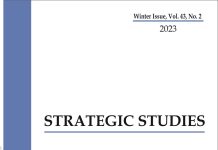Abstract:
The intricate nature of the political infrastructure determines the relationship between states and markets whether it is in a form of a centralised state, regulated market (Pakistan); or decentralised state, unregulated market (US). This paper will examine the relation between fiscal deficit and economic growth of Pakistan, by looking at the data for 30 years from 1980 to 2010. The study will examine the association of some of the key macroeconomic variables like non-Development Expenditure, Development Expenditure, Inflation, Foreign Debt, Domestic Debt, Foreign Portfolio Investment, Tax Revenue, and non-Tax Revenue with the country’s fiscal deficit and their effect on its economic growth. The role that the Pakistani state has played through its various policy decisions to manage the fiscal deficit, and how these have had negative implications for the economy will be also be looked at.












